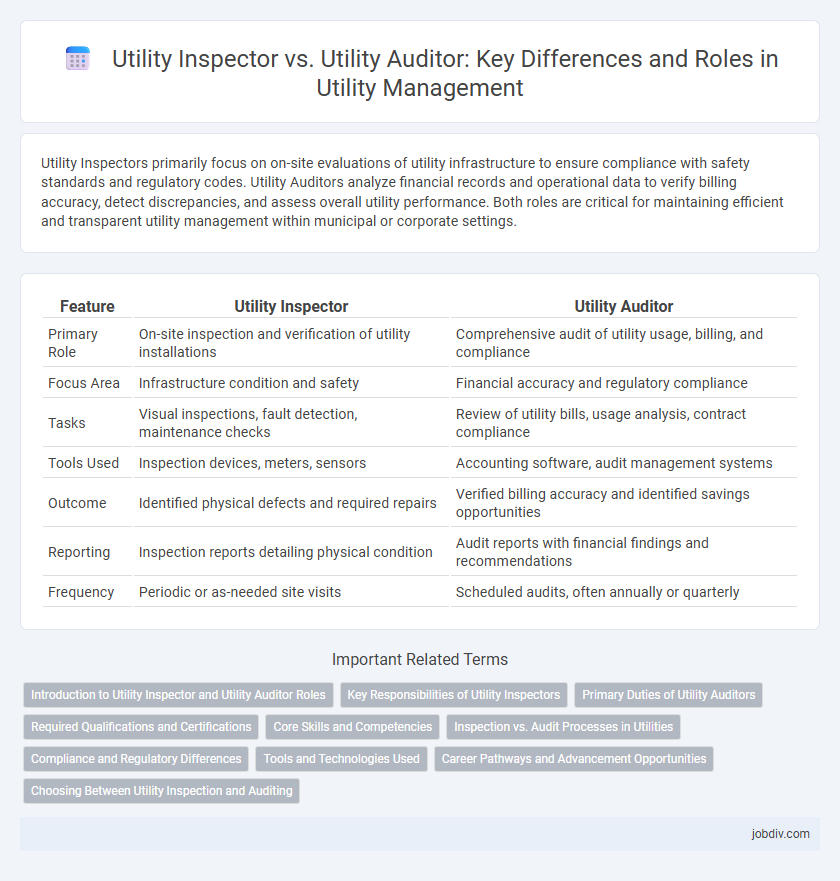Utility Inspectors primarily focus on on-site evaluations of utility infrastructure to ensure compliance with safety standards and regulatory codes. Utility Auditors analyze financial records and operational data to verify billing accuracy, detect discrepancies, and assess overall utility performance. Both roles are critical for maintaining efficient and transparent utility management within municipal or corporate settings.
Table of Comparison
| Feature | Utility Inspector | Utility Auditor |
|---|---|---|
| Primary Role | On-site inspection and verification of utility installations | Comprehensive audit of utility usage, billing, and compliance |
| Focus Area | Infrastructure condition and safety | Financial accuracy and regulatory compliance |
| Tasks | Visual inspections, fault detection, maintenance checks | Review of utility bills, usage analysis, contract compliance |
| Tools Used | Inspection devices, meters, sensors | Accounting software, audit management systems |
| Outcome | Identified physical defects and required repairs | Verified billing accuracy and identified savings opportunities |
| Reporting | Inspection reports detailing physical condition | Audit reports with financial findings and recommendations |
| Frequency | Periodic or as-needed site visits | Scheduled audits, often annually or quarterly |
Introduction to Utility Inspector and Utility Auditor Roles
Utility Inspectors evaluate the safety, compliance, and performance of utility infrastructure, ensuring adherence to regulatory standards and operational protocols for services such as electricity, water, and gas. Utility Auditors analyze utility consumption data, financial records, and billing accuracy to identify discrepancies, optimize resource usage, and prevent fraud. Both roles are critical in maintaining efficient, safe, and cost-effective utility operations across public and private sectors.
Key Responsibilities of Utility Inspectors
Utility Inspectors are primarily responsible for examining utility systems such as water, gas, and electricity to ensure compliance with safety regulations and operational standards. They conduct routine inspections, identify potential hazards, and report any discrepancies to prevent service disruptions and accidents. Utility Inspectors also verify maintenance procedures and oversee repair work to guarantee the reliability and safety of utility infrastructures.
Primary Duties of Utility Auditors
Utility Auditors primarily conduct comprehensive financial and operational reviews to ensure compliance with regulatory standards and identify cost-saving opportunities. They analyze utility billing, procurement processes, and contract compliance to detect discrepancies and prevent fraud. Their role also involves preparing detailed audit reports and recommending improvements for efficiency and transparency within utility companies.
Required Qualifications and Certifications
Utility inspectors typically require a technical background in engineering or construction, along with certifications such as OSHA safety training and National Institute for Certification in Engineering Technologies (NICET) credentials. Utility auditors often need accounting or finance degrees, paired with certifications like Certified Internal Auditor (CIA) or Certified Public Accountant (CPA) to conduct financial and performance audits effectively. Both roles emphasize industry-specific knowledge, but inspectors prioritize safety and technical compliance, while auditors focus on regulatory and fiscal accuracy.
Core Skills and Competencies
Utility Inspectors possess core skills in regulatory compliance, safety standards enforcement, and on-site operational assessments to ensure utility systems meet legal and technical requirements. Utility Auditors specialize in financial analysis, cost control, and performance evaluation, leveraging expertise in data analytics and risk assessment to identify inefficiencies and validate billing accuracy. Both roles require strong communication, attention to detail, and knowledge of industry regulations, but Inspectors focus on physical infrastructure integrity while Auditors concentrate on financial and operational accountability.
Inspection vs. Audit Processes in Utilities
Utility inspectors conduct on-site evaluations to ensure infrastructure compliance with safety standards, focusing on physical asset conditions, operational functionality, and regulatory adherence. Utility auditors perform systematic reviews of financial records, contract agreements, and billing practices to verify accuracy, detect fraud, and assess the effectiveness of utility cost management. Inspection processes emphasize real-time operational assessments, while audit processes prioritize detailed financial validation and procedural integrity within utility companies.
Compliance and Regulatory Differences
Utility Inspectors primarily ensure compliance with safety and operational regulations by conducting on-site assessments and verifying adherence to technical standards. Utility Auditors focus on reviewing financial records and operational processes to ensure regulatory compliance with billing accuracy, cost allocation, and contractual obligations. While inspectors address physical and safety compliance, auditors concentrate on fiscal and procedural regulatory adherence.
Tools and Technologies Used
Utility Inspectors frequently utilize portable measurement devices, thermal imaging cameras, and GIS mapping software to conduct on-site inspections and verify infrastructure compliance. Utility Auditors rely heavily on advanced data analytics platforms, audit management software, and real-time monitoring systems to assess financial records, usage patterns, and regulatory adherence. Both roles integrate Geographic Information Systems (GIS) and mobile applications to enhance accuracy and streamline reporting processes in utility management.
Career Pathways and Advancement Opportunities
Utility inspectors typically begin their careers with fieldwork, focusing on safety inspections and compliance monitoring, which can lead to advancement into senior inspection roles or supervisory positions. Utility auditors often start with financial analysis and regulatory compliance tasks, progressing toward senior auditing roles, management, or specialized fields like risk assessment and internal controls. Both career pathways offer opportunities for advancement through certifications, continued education, and gaining expertise in regulatory frameworks or technical standards.
Choosing Between Utility Inspection and Auditing
Choosing between a utility inspector and a utility auditor depends on your specific needs: utility inspectors focus on the physical condition and compliance of infrastructure, ensuring safety and operational standards, while utility auditors analyze billing accuracy, usage patterns, and contract efficiency to optimize costs. Organizations aiming to maintain regulatory compliance and avoid service disruptions should prioritize utility inspections. In contrast, those seeking to reduce expenses and improve financial management benefit more from utility audits.
Utility Inspector vs Utility Auditor Infographic

 jobdiv.com
jobdiv.com